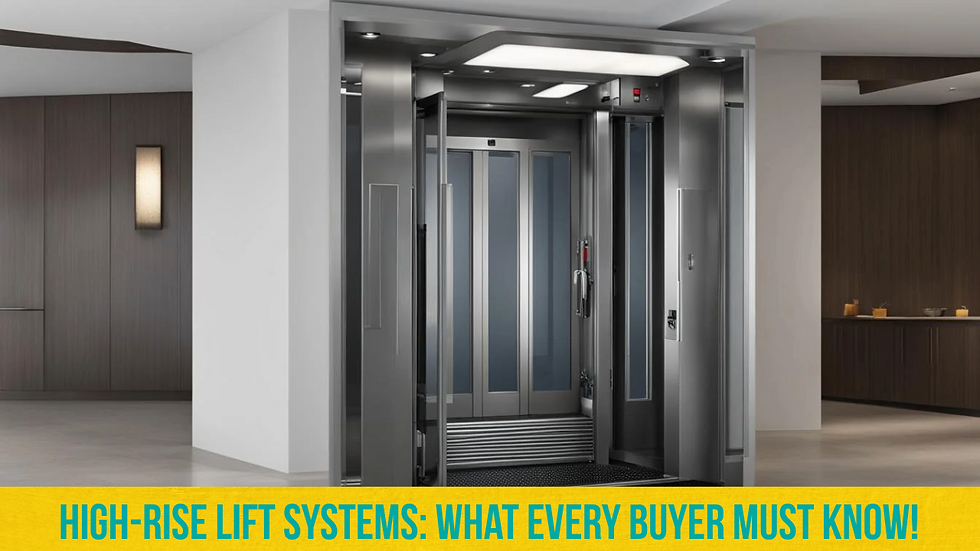How to negotiate high-value SITC contracts?
- Arvind Dang
- Jul 22, 2025
- 4 min read
Updated: Aug 21, 2025

What are considered high-value contracts
Those types of contracts that involve SITC scope (supply, installation, testing & commissioning) and usually need integration with other large ongoing project packages at the site. Here, the company document to be given to the contractor is generally called an Agreement.
A few examples of high-value contracts are as below.
Setting up of new manufacturing plants for EV-electric vehicles
Setting up Heavy engineering and fabrication works, e.g., for manufacturing turbines
Setting up factories for Precision engineering companies needed for the Defence sector or aircraft
SITC for Lifts and escalators for large projects like International Airports or residential complexes
External & Internal Electrical works for large Projects
Air conditioning and Basement ventilation are important for large projects
as are Plumbing, Fire detection, and firefighting.
We’re evaluating a premium lift system designed for a high-traffic office environment.
The goal is to estimate costs from the ground up and negotiate smartly with vendors.
The lift must ensure speed, safety, security, and comfort, alongside long-term reliability.”
Please refer to my YouTube video on this article as per the link below:
Key components and material cost estimation
Estimating Material Costs – First Principles
Break down every component—Traction system, Gearbox, car frame, guide rails, cables, panels, lights, rescue system.
Use OEM datasheets or similar past projects to benchmark quantity, weight, and specs.
Add import costs, taxes, and logistic margins.
A resource template RT01 is proposed for estimating the costs (for our illustration of lift system )as Rs 41.60 Lacs as per the computation in the next slide
The Material description, quantities, and rates/values indicated in the illustration are hypothetical for your easier understanding, and actuals can vary considerably
Installation Process – Activities negotiating team must know & capture the following
Installation isn’t just physical fixing. It also includes scaffolding setup, shaft alignment, rail fixing, car frame, counterweights, door panel fitting, and wiring.
Track man-hours, equipment used, and lift well readiness.
Errors here impact safety and timelines later.”
Testing Process – Activities
The negotiating team must know the requirements for testing, Safety & Performance
Testing checks the system’s heart—load trials, overspeed checks, emergency stop, and door safety.
It includes power-off simulations, vibration checks, and speed calibration. Noise levels
These tasks require skilled engineers—don’t under-budget here.”
Commissioning – The Final Checkpoint
The negotiating team must know the requirements for Commissioning to put the Lift ready for use
It’s not just a test run.
Commissioning means checking floor-level accuracy, touch panels, call buttons, and Building management system integration.
Also, it evaluates emergency alarms, waiting time logic, security features, and user comfort.
Capture soft metrics too.
Manpower Estimation – Skilled & Unskilled Many People, What Skills, How Long?
Break tasks by role: installer, testing, and commissioning
Identify mechanical technicians, electricians, quality inspectors, engineers, and unskilled helpers.
Estimate man-day rates for each skill as well as unskilled rates ( as total cost to the company)
Map tasks to man-days and multiply by manpower rates
In the next slide, in the Resource template RT02, the computation of manpower cost is shown separately for Installation, testing & commissioning.
In our illustration, the amounts work out to Rs 96k, Rs 30k, and Rs 50k, respectively (total = Rs 176,000).
The skill description, man-days, and costs per manday indicated in the illustration are hypothetical for your easier understanding, and actuals can vary considerably
Statutory Requirements & Approvals Legal and Safety Approvals
List licenses needed from the State Lift Inspector, structural stability certificates, load testing documents, and third-party validation reports.
These are costly and time-consuming—vendors must comply.
Penalize non-compliance in contracts.”
These are estimated as Rs 2Lac as summarised below (indicative only)
Installation = Rs 100,000 Testing= Rs 20,000 Commissioning =Rs 80,000
Estimating Total Costs (SITC) for the “Lift system” Resource template: RT04
The summary below captures all costs as above + Overheads + contractor margin+Taxes
Materials cost = Rs 41,60,000 (RT01.)
Manpower costs -Installation, Testing & Commissioning -=Rs 176,000 (RT02)
Equipment ,tools, manufacturing & marketing variable costs - = Rs 1,34,000 (RT03)
Statutory approval costs= Rs 200,000
Subtotal of Costs as above = Rs 46,72,000
Overheads% to negotiate
Margin = To negotiate as %
Taxes =As applicable
Total Cost = Rs 46,72,000 + OH+ Margin+ Taxes
Negotiation Strategy – With Technical Strength a Strategic Negotiator, which is fair and data-backed
Know your numbers. Compare competing vendor breakdowns.
Question excesses—materials, man-days, equipment, tools & other costs margins.
Use technical logic
Negotiate terms and conditions, as they are also very crucial
Negotiate AMC rates (beyond defect liability period) –while negotiating contract price as well, (say for 4-5 years), as you may gain some strategic advantage
Top 10 clauses to negotiate. There are 140 clauses (34 domestic purchase +16 imports related purchase +90 installation, testing & commissioning related & clauses ) listed in Section 3 of my Udemy course for negotiation for high value SITC contracts. The top 10 clauses are captured below.
Scope of Supply, installation, testing & commissioning, and Responsibility Matrix,
Delivery, installation, testing & commissioning Schedule with Linked Penalties/Bonuses
Payment Terms Linked to Milestones
Warranty and Defect Liability Period (DLP)
Advance Payment and Performance Guarantees
Statutory conformance requirements and their payments
Legal clauses such as Force Majeure, jurisdiction, etc
Quality requirements and standards to comply with
Risk management clauses
Change Order Management
Mastering the art of deal-making with data, insights & experience





Comments